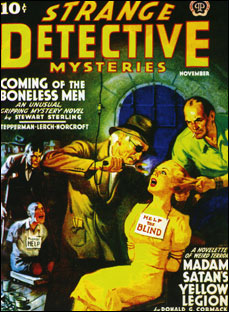
INFLUENTIAL: Pulp fiction is key to American culture. |
Don’t throw out anything. If you want to understand your culture, America, don’t discard any contribution, even the trash fiction that’s at the opposite end of the literary spectrum from Good Books.
In that spirit the Pulp Uncovered festival taking place March 15-18 at Brown University was born. The roots of everything from adventure movies and film noir to today’s beach blanket reading owe much to the pulp magazines of the 1920s to 1940s. The festival wants to show us why we should care.
“Out of those you get pulp novels in the ’50s, comics in the ’30s,” says festival director Scott Tiffany, a filmmaker and Brown graduate student in public humanities. The event was his idea. “Focusing on the ’20s, ’30s, ’40s seems to make good sense. That’s really when it started, when it had the strongest impact on the culture.”
Tiffany traces popular working-class fiction back to the late 1700s in England, bringing it forward through the dime novel Westerns and penny dreadfuls of 19th-century America and into the post-World War I pulp publications of the 1920s, when science fiction magazines, for example, came out for the first time.
“Out of that the hard-boiled detective is born,” he says. “Film noir, which is so popular today, that noir look, is basically the gumshoe detective, a hard-boiled detective on the screen — they ripped those detectives out of the magazines.
“The idea of the superhero you see in the pulps before you see it in the comics,” he says. “The Shadow, the Spider, the Bat Man — before he was Batman — are figures that appear in pulp magazines before they appear in comics. Before Superman was the first huge comic guy — he was the Man of Steel — Doc Savage was the Man of Bronze. He was a pulp character.”
Joining in the discussion at the John Nicholas Brown Center is the director of the center, professor of American civilization Steven Lubar. “I guess I’m one of those people who could imagine rolling their eyes and saying, ’Why look at all this pulp?’ ” he says. “ ’There’s enough adventure in Moby-Dick, you don’t need to read pulp fiction.’ The answer is that it’s so important for understanding American culture. It shapes the way people think about the world.”
Lubar says that a fundamental contribution was made by all this bad writing. “It changed the lives of our imaginations,” he points out. “In most of them, there is this underworld of crooks and horror or this overworld of science fiction heroes and detectives and superheroes. I think it opens up the imagination in a fascinating way. There’s interesting scholarship on the way that people in the space program, they’re the ones who are reading those science fiction pulps, they’re the ones who are thinking, ’Yes, I will go to the moon someday when I grow up.’ So you can trace out the inspiration, especially on the science fiction side, that shows up when we go to the moon, that shows up in real life.”
 Related
Related:
Hero worship, Mixing it up, 2006 restaurant awards, More 
- Hero worship
The lesson of the Sci-Fi Channel’s Who Wants To Be a Superhero? might seem obvious.
- Mixing it up
Perishable Theatre has dedicated itself to being a research theater, adopting a chemistry lab flask in its logo to emphasize the point.
- 2006 restaurant awards
Well, here we are in our imaginary tuxedos, passing out imaginary awards for fine-dining experiences — culinary performances which are sometimes hard to repeat and usually go undocumented.
- A universal tale
Success has earned The Fantasticks a bad rap.
- Review: deca go go
If you're enjoying Elemental Theatre's wild and whimsical deca*go*go at Perishable Theatre (through March 1), you're not likely to be reminded of Elizabethan sonnets, but think about it.
- No advil, no booze
...Musing on science fiction, existentialism, and stalker ex-husbands.
- The Signal
There should be a rule in science fiction that there can’t be more than one weird gimmick.
- Cast of characters
Improv comedy sure is catching on.
- URI series highlights the music of dissent
Word is getting out.
- Twisted sister
Wow. An explosive performance could be anticipated, since Hedwig and the Angry Inch is the story of an anguished life transformation.
- Movies from outer space
Our new-found DVD-ness and cable-TV luxury notwithstanding, movies have always been a public medium, a spatial experience we share in the theater and a topical experience we share in the culture at large.
- Less

 Topics
Topics:
Museum And Gallery
, Entertainment, Movies, Science Fiction, More  , Entertainment, Movies, Science Fiction, Brown University, John Nicholas Brown Center, Less
, Entertainment, Movies, Science Fiction, Brown University, John Nicholas Brown Center, Less 